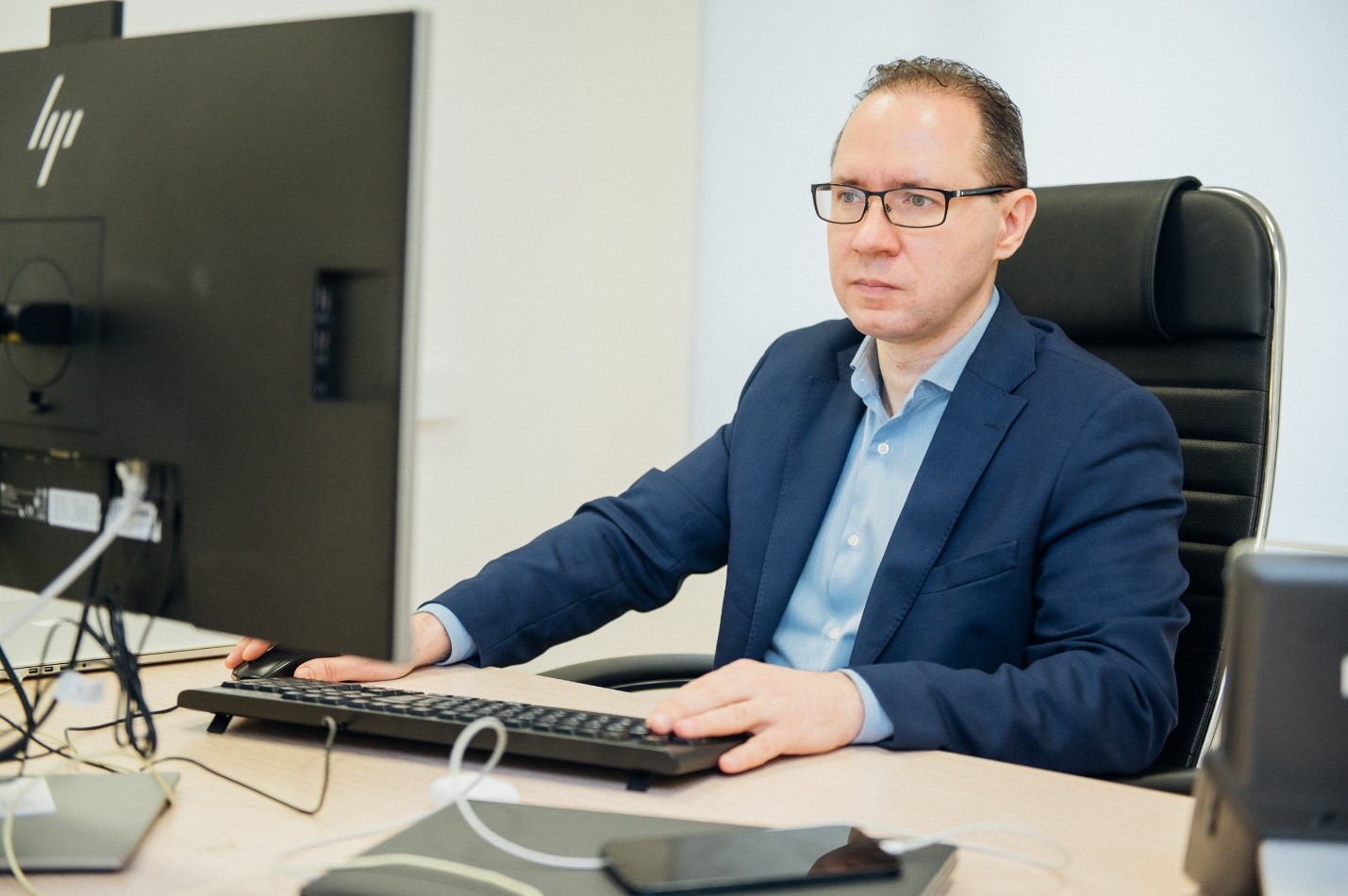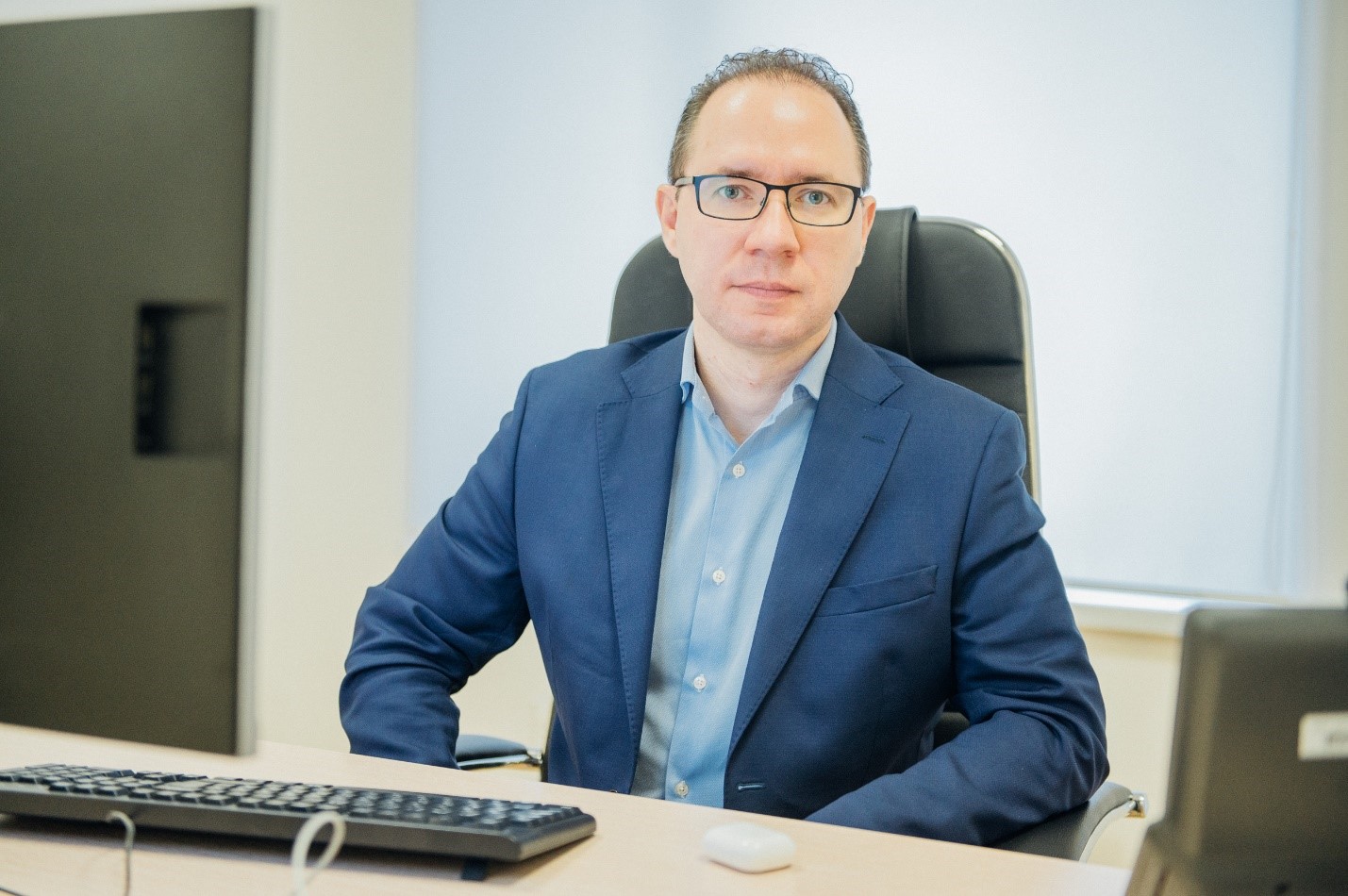'We’re Moving On to the Next Stage of Digital Transformation'
%20(1).jpg)
Dmitry Bondar has served as Senior Director for Digital Transformation at HSE University since January 2021. Since then, the university has introduced and developed numerous new, state-of-the-art information systems. Dmitry Bondar is responsible for ensuring high rates of digital transformation and the good performance of HSE's IT Office. In his interview, he speaks about the integration of new information systems, project management at the IT Office, import substitution in IT, engaging with students, and plans for the current year.
— HSE is a university committed to continually improving its digital environment. What new information systems have been launched in the past year?
— Currently, the university is working to automate its primary business processes in a comprehensive manner. In 2022, several teams collaborated to implement a number of systems, including those for managing admissions, engaging with partners, applicants and contractors, developing academic programmes, and handling procurement and financial accounting.
Our plans for this year include the implementation of several new foundational systems, such as HSE.Reg for managing student records, the Marketplace for educational products, MVP for continuing professional education, microdegree and online courses, the Joint Economic and Social Archive platform for consolidating research across various fields of science, and SmartPro, a system for automating students’ practical training. In fact, we are nearing completion of the comprehensive automation stage. This will stabilise the university's IT landscape, enabling us to advance to the next stage of digital transformation.
— What challenges do you anticipate the IT Office will encounter along the way?
— The previous stage was the most challenging one for the university. During that period, the new interfaces did not necessarily provide benefits for regular users; on the contrary, they could instead add complexity to their work. However, advancing to the next stage would have been impossible without the development and implementation of foundational information systems. The work ahead will be equally labour-intensive, but this time, the changes will have a more substantial impact on both the university's overall performance and individual users.

'We need to be pioneers in the implementation and application of domestically produced digital solutions'
— Import substitution in IT is a major priority for Russian universities today. What processes have been initiated at HSE in this regard and which ones do you anticipate will start shortly?
— Currently, the university is confronted with the unavailability of services and software from foreign manufacturers, coupled with an increase in legislative measures that require the use of domestic IT solutions. Often, we need to be pioneers in the implementation and application of domestically produced digital solutions in the educational process.
In January 2023, the IT Office uploaded a section to the HSE University's website with a list of digital services to be replaced by domestically developed solutions and the current status of their substitution
'Future human resources for the Digital Economy'
— The IT Office is a major employer. Can you tell us about your projects that aim to involve HSE students?
— Students are the most valuable resource of any university. We are particularly committed to engaging proactively with the student community.
For example, last summer, we launched the first enrolment in the IT Staff Development Programme. This internship programme offers students interested in pursuing digital professions an opportunity to start their careers in the IT industry. Students gain an insight into what it takes to practice their chosen IT profession, while also acquiring new competencies, knowledge, and skills in the field.
Based on the results of the pilot enrolment, two students were invited to join the IT Office team. We are currently conducting a second enrolment and looking forward to welcoming more talented students to the IT Office.

Another important project is the HSE University Digital Assistants. The project was initially launched to assist individuals who faced challenges in using digital technology during the pandemic.
Today, the Digital Assistants not only provide assistance and advice in Russian and English through the student-operated Hotline, but they also offer support during online events, work with digital product teams, and even provide digital support outside of the university
They collaborate with charitable foundations through digital volunteering, conduct masterclasses on digital literacy and culture, and provide support for major external online events. Moreover, digital volunteering opens up career opportunities: five students from various courses and programmes have joined the IT Office.
After gaining experience working with our team, many Digital Assistants have been hired by large IT companies. We are pleased to see our students as valuable human resources for the digital economy. We are committed to sharing our positive experience with other Russian universities through our university partnership programme. This will enable our colleagues to launch similar projects at their own institutions.
Our plans for the near future include the launch of a socially significant project called 'Supporting Digital Access to Education for People with Disabilities', which also involves the Student Council's Digitalisation Committee, Digital Assistants, and HSE students with disabilities. We still have a lot of work ahead of us to achieve our overall goals and to develop new ideas and plans for further advancing the university's digital environment.
See also:
Larger Groups of Students Use AI More Effectively in Learning
Researchers at the Institute of Education and the Faculty of Economic Sciences at HSE University have studied what factors determine the success of student group projects when they are completed with the help of artificial intelligence (AI). Their findings suggest that, in addition to the knowledge level of the team members, the size of the group also plays a significant role—the larger it is, the more efficient the process becomes. The study was published in Innovations in Education and Teaching International.
Designing an Accurate Reading Skills Test: Why Parallel Texts are Important in Dyslexia Diagnosis
Researchers from the HSE Centre for Language and Brain have developed a tool for accurately assessing reading skills in adults with reading impairments. It can be used, for instance, before and after sessions with a language therapist. The tool includes two texts that differ in content but are equal in complexity: participants were observed to read them at the same speed, make a similar number of errors, and understand the content to the same degree. Such parallel texts will enable more accurate diagnosis of dyslexia and better monitoring of the effectiveness of interventions aimed at addressing it. The paper has been published in Educational Studies.
Intellectual Capital in the Face of Shocks: Russia and Iran Explore Internationalisation
In today's issue of Schola, Mariya Molodchik, Senior Research Fellow at the International Laboratory of Intangible-Driven Economy and Professor at the School of Economics and Finance at HSE University’s Campus in Perm, discusses a joint project with Iran University of Science and Technology, titled 'Internationalization of Companies from Developing Countries: The Role of Intellectual Resources in Response to Exogenous Shocks.'
HSE Researchers Introduce Novel Symmetry-Aware Neural Network Architecture
Researchers at the HSE Laboratory for Geometric Algebra and Applications have developed a new neural network architecture that can accelerate and streamline data analysis in physics, biology, and engineering. The scientists presented their solution on July 16 in Vancouver at ICML 2025, one of the world's leading conferences on machine learning. Both the paper and the source code are publicly available.
Students from HSE and Other Universities Carry Out Research Expedition at New Chersonesos
As part of the Rediscovering Russia student expedition programme, HSE University organised a research trip under the framework of the School for Young Humanities Scholars to the New Chersonesos museum and church complex in Sevastopol. The results of this expedition will form the basis for proposals on educational projects aimed at shaping young people’s historical memory of the role of Chersonesos, Crimea, and the Byzantine legacy in the history of Russian culture and statehood.
HSE Researchers Determine Frequency of Genetic Mutations in People with Pulmonary Hypertension
For the first time in Russia, a team of scientists and clinicians has conducted a large-scale genetic study of patients with pulmonary arterial hypertension. The team, which included researchers from the International Laboratory of Bioinformatics at the HSE Faculty of Computer Science, analysed the genomes of over a hundred patients and found that approximately one in ten carried pathogenic mutations in the BMPR2 gene, which is responsible for vascular growth. Three of these mutations were described for the first time. The study has been published in Respiratory Research.
First Caucasus School on Experimental Research and Cognitive Sciences Takes Places in Adygea
On September 17–20, 2025, the First Caucasus School on Experimental Research and Cognitive Sciences took place at the Gornaya Legenda venue of Adyghe State University (ASU). The event was organised by the ASU Experimental Linguistics Laboratory, the HSE Centre for Language and Brain, and the HSE Centre for Sociocultural and Ethnolinguistic Studies. The school brought together over 50 participants—students, doctoral candidates, and early-career researchers from across Russia, along with lecturers and speakers from France, Serbia, China, Turkey, Kazakhstan, and Uzbekistan.
HSE Scientists Reveal How Disrupted Brain Connectivity Affects Cognitive and Social Behaviour in Children with Autism
An international team of scientists, including researchers from the HSE Centre for Language and Brain, has for the first time studied the connectivity between the brain's sensorimotor and cognitive control networks in children with autism. Using fMRI data, the researchers found that connections within the cognitive control network (responsible for attention and inhibitory control) are weakened, while connections between this network and the sensorimotor network (responsible for movement and sensory processing) are, by contrast, excessively strong. These features manifest as difficulties in social interaction and behavioural regulation in children. The study has been published in Brain Imaging and Behavior.
Scientists Develop New Method to Detect Motor Disorders Using 3D Objects
Researchers at HSE University have developed a new methodological approach to studying motor planning and execution. By using 3D-printed objects and an infrared tracking system, they demonstrated that the brain initiates the planning process even before movement begins. This approach may eventually aid in the assessment and treatment of patients with neurodegenerative diseases such as Parkinson’s. The paper has been published in Frontiers in Human Neuroscience.
Global AI Trends Discussed at International Foresight Workshop at HSE University
At an international foresight workshop on artificial intelligence held at HSE University, Russian and foreign scholars discussed the trends and challenges arising from the rapid development of AI.


